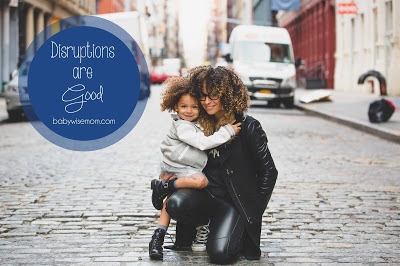Disruptions to the routine can be very scary, but often times they are necessary and even good for your routine. Find tips for getting through them here.

Disruptions to your routine are good.
Yep, you read that right.
I would even say that disruptions to your routine are necessary.
Now, I am not saying to disrupt every nap or even to disrupt your routine every day, but I think disruptions on occasion are good for the whole family.
Post Contents
Why Disruptions to Routine are Good
Living a consistent schedule or routine can get to be quite monotonous.
Mom will go crazy if she never leaves the house. Older siblings will get restless if they never leave the house.
Children will learn to bounce back from disruptions, and sometimes disruptions will help reset things to be back in the proper order.

Common Disruptions to Routine and How to Handle Them
What are some of the ways we get disrupted in life? And how do we deal with them? Here it is.
Church
For my husband and me, church is very important.
Our church is three hours long, so even though it is a mere five minute drive from our house at most, it is always a disruption.
I have a post entirely dedicated to church and how we deal with the disruptions it brings.
For the purposes of this post, know that we go each week. Know that it is over one of McKenna’s naps and she doesn’t sleep at church. And know that it is over Kaitlyn’s entire afternoon nap.
It isn’t an easy thing, but it is important to us so we go each week.
Read: How To Expertly Manage Disruptions to Your Baby Routine
Playdates
Sometimes, naps will get disrupted due to playdates with friends or visits to the park with friends.
My exact tolerance for disruptions caused by this varies based on age and ability of the child.
We have a large group of friends that go to the park weekly when the weather is nice. Here is how we have handled it.
When Brayden was a pre-toddler (ages 12-18 months), he couldn’t handle late naps. He needed his naps on time. The latest we would ever be for naps due to these activities was 30 minutes–and that is if I was being lenient and he was being good.
When Brayden was a two year old and Kaitlyn was a baby, he could handle a bit more disruption, but not a lot.
We would sometimes stay out until 2. I would try to get Kaitlyn to sleep at the park for a nap.
If Kaitlyn was having a rough day, we wouldn’t go. We also didn’t necessarily go every week. As she got older but was still a baby, we went less often because she just wouldn’t sleep unless she was in bed.
When Brayden was three and Kaitlyn was a pre-toddler, we could stay longer. Brayden could handle later naps and so could Kaitlyn. We would do 2-2:30.
When McKenna was a newborn, we handled things similarly to when Kaitlyn was a baby. McKenna would fall asleep easier at the park and for longer than Kaitlyn did.
This year, McKenna will be pre-toddler age. She still takes 2 naps and her second nap doesn’t start until 2:30. I imagine this year we will stay until 2-3.

Weekends
I think for many families, a lot of structure goes out the window when Dad is home.
It is that way for us. When Dad is home, we have meals on time. Naps tend to start around the same time-ish.
But things like independent playtime and such are typically non-existent unless Dad is really busy with something.
Holidays
By holiday I am meaning when Dad is home for an extended period, which for us happens around holidays.
For us, holidays are basically one long weekend. If behavior starts to get bad, I re-institute independent play, but otherwise, we just relax and don’t worry about it.
Vacations
I try to keep naps as consistent as possible on vacations. I find when I do, the children last a lot longer in a happier state. But we allow flex as the child is able to handle.
I also try to keep meals as consistent to our typical schedule as possible.
Random
You might have some random visitors or a random lunch that lasts longer than expected.
I remember one time when McKenna was 8 months old. We had lunch with family in town, then went shopping. She ended up being three hours late for a meal! She had been fine and happy the whole time.
It is the only time in her first year she was more than 30 minutes late, but she survived just fine and wasn’t fussy about it in the least.
Factors To Consider with Disruptions
No matter the disruption, there are factors to consider as you encounter them:
- Ability of Child: Some children handle disruptions better than others. Brayden and Kaitlyn didn’t (and don’t) do well if a meal is late. Brayden couldn’t have late naps or bedtime. Kaitlyn can and could. McKenna can and could. Take the abilities of your children into consideration as you work around disruptions. More touchy children like Brayden are harder to work around, and you basically just have to “suck it up” and deal with that. It won’t last forever.
- Frequency: When dealing with a disruption, consider the frequency of it. There are routine, weekly disruption that you need to learn to just work around. If a child will be disrupted Sunday for church, it is probably best to make Saturday and Monday as consistent as possible. I don’t make appointments or anything on Mondays. I make sure sleep is full on Saturdays.
- Needs of Family: The whole family needs to get out sometimes. Getting out into the world and visiting places and people just rejuvenates your psyche. It makes remaining consistent easier.
Conclusion
If you have any questions about disruptions that you encounter, please feel free to ask away! Don’t be afraid of disruptions. Yes, you want to establish consistency, but once you do, you can all handle disruptions. You will all benefit from it! Be sure to look through the related posts below.
RELATED POSTS
- Going to Church Without Ruining Your Baby’s Sleep
- Sleep Disruptions You Will Face as a Babywise Mom
- Managing Disruptions to the Routine
- Tips for Feeding Baby and Napping Away From Home
- Adjusting for Context Using Babywise
- The More You Do It, The More Your Child Will Get Used To It
- How To Go Out with Your Babywise Baby
